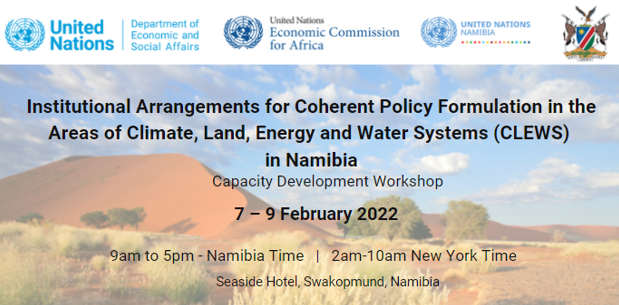
UN DESA/DPIDG and EAPD, the Namibia Resident Coordinator’s Office, UN ECA, UNDP, FAO and the Namibian National Planning Commission held a hybrid workshop from 7-9 February 2022 in Swakopmund, Namibia to discuss how to develop, transfer and apply the Climate, Land, Energy and Water systems (CLEWs) framework - a tool suited to assess interlinkages and trade-offs between sustainable development policies - and how to strengthen the institutional arrangements to support integrated approaches to policy formulation and coherence. Senior representatives and technical staff from the Ministry of Agriculture, Water and Land Reform, the Ministry of Mines and Energy, the Ministry of Environment, Forestry and Tourism, the Namibia Statistics Agency as well as lecturers from the University of Namibia and the Namibia University of Science and Technology joined the workshop. DPIDG discussed how to develop the working arrangements between different stakeholders (analysts, policymakers, and senior decision makers) to establish inter-ministerial/ inter-institutional team(s) that can respond to policy-related analytical needs as they arise and to develop institutional coordination mechanisms that can resolve conflicts or inconsistencies between the relevant stakeholders.
The government of Namibia has requested UN support to assess policy strategies to implement the Harambee Prosperity Plan II (2021-2025), which has the objective to accelerate the national development of Namibia and strengthen the governance structure of the country. The plan aimed to unlock targeted projects of the country, while emphasizing the need to better manage Namibia's natural resources and public assets. An initial meeting with the senior level representatives of the relevant ministries took place in June 2021.
Supporting material :
- Concept Note;
- Programme;
Contact information :
Veronique Verbruggen, Senior Interregional Advisor, DPIDG / UN DESA | Email: @email
Thomas Alfstad, UN DESA-EAPD | Email : thomas.alfstad@un.org
 Добро пожаловать в ООН!
Добро пожаловать в ООН!